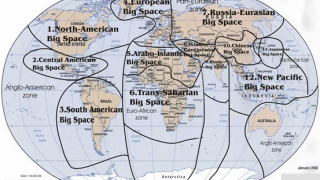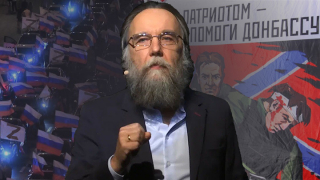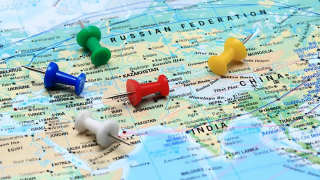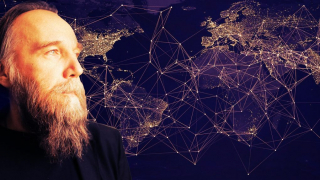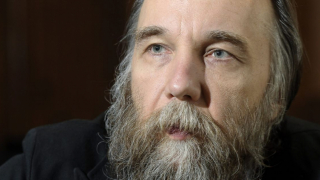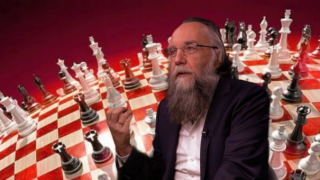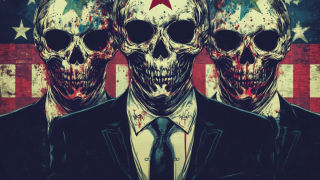Horizons of the Fourth Political Theory: Introduction
After the collapse of collectivist ideologies, there has been the statement claiming "the end of history": capitalism and globalization were displayed as insurmountable things.
Most people stopped pursuing true alternatives, and those who continued to do so, anchored their thinking to existing alternatives, with the bitterness of not seeing those alternatives come true, or with the disappointment of seeing that it wasn’t what they were waiting for.
We need a State and People capable of facing the problems regarding globalization, religion, immigration, and financial markets, but for doing so we must rethink our definition of economic, political and cultural systems, and face dogma from liberalism, false religion, communism and neo-fascism.
This book aims, among other things, to help create an ideological approach that overcomes modernity, hence its title, so that the most fundamental political problems can be addressed, and make people aware of them.
This thought arises from an expansion of what was proposed by the Russian intellectual Aleksander Dugin. He had the decision to create a fourth political theory to overcome modernity, opposing the three previous theories, liberalism, Marxism, and the third political theory (fascism and national-socialism). Dugin served as basis and inspiration for me to capture in this book what I think should be the final structuring of this fourth political theory, a structure that I have decided to name as "normativism", since the purpose of it is to set standards in society, that is ideals, so that social sectors and economic, religious and political structures function as an organic body.
The Fourth Political Theory must be, as Aleksander Dugin has said, something that does not belong to the left, neither to the right nor centrist political spectrum, but being something syncretic that integrates the useful thoughts of each one of the different schools of human thought.
The Fourth Political Theory is an attempt to overcome the other three theories that have already shown their nefarious consequences, that is liberalism, fascism, and communism.
It is also an attempt to create a political theory to fight against the hegemonies that seek to strengthen the different universalisms in the world, and which try to pull the world aside from its vital multipolarity, since they seek to create enormous centres of power and universalize doctrines, that are considered as the only possible truth.
The universalisms that inevitably are the main enemies of the Fourth Political Theory are the liberal universalism that comes from the West, and the universalism of the Vatican, from which everything possible has been done to expand the creed of the Roman Catholic Apostolic Church, with the Eastern Orthodox Church as one of its main obstacles.
Of these two universalisms, the most powerful and therefore the most dangerous is liberal universalism, which has the resources of the West, trying to destroy any alternative to its economic, political and cultural system which they want to make see as the only possible alternative.
This book will show essential guidelines that can help in the historical evolution of politics, religion and economics, accelerating this evolution with thoughts and reflections on various issues that affect the lives of Russians and other peoples around the world.
We must consider as very important the classification of the popular will in authentic will and manifested will, pose a different economic system to both capitalism and communism, a new
anthropology based in spiritual races instead of merely biological and material classifications, a new form of government and a reborn spirituality. Through these concepts, normativism aims to be an alternative to the ideologies imposed by liberalism, such as materialism, capitalism and liberal democracy.
According to Dugin, in a framework where there is no competition from communism and fascism, liberalism is now dying in the form of post-liberalism and post-modernity, which destroys the liberal rationality itself and that of the modern world, giving rise to a totalitarianism that tries to be a transgressor of everything, in an attempt to destroy the very soul of the peoples.
The parties calling themselves leftist and right-wing have become obsolete, their decline marks the arrival of a new era for the world, an era where the old ideologies must be overcome in the light of a new analysis of society.
The intervention of the State will be crucial, in the context of new rules in the playing field among institutions, rules whose purpose is to shape the way in which the State itself establishes its relationship with the sectors of society and the world, in its civilizing role.
But the role of other agents, different from the State, will be equally crucial, so that we can follow an ideological path that fills true popular expectations, without mortgaging the future of coming generations or plunging us into the false conceptions which led to dead ends.
The book mentions the economic, spiritual and philosophical aspects on which the Fourth Political Theory is based, including those that concretely define the normativist ideal.
In addition to a healthy protectionism, through a simple system which I propose, the book shows how supply and demand can be levelled aimed at building an economic harmony based on the suppression of free mobility of business capital and the end of crises caused by capitalist accumulation.
The concept of freedom is more appreciated in capitalism than the notion of equality, while in communism the concept of equality is more appreciated than the concept of freedom. We must put into practice a system where neither of the two concepts is more appreciated than the other.
The last half of the book is devoted to spiritual concerns, including the existence of spiritual races and the mission of Russian Orthodox Church.
Patriotism, as stated in this book, is not the same as the nationalism of the third political theory, but a thought aimed at the cooperation between different peoples to fight against liberal universalism and the other universalisms.
The history of the long conflict between the Eastern Orthodox Church and Rome is also reviewed, and reasons to defend and clarify the theological thought of the Russian Orthodox Church are shown, together with contributions related to theology, spiritual anthropology and a new focus for explaining World history.
The normativist model and project consists of seven pillars, the first is a new economic system that differs both from capitalism and communism, which appears in the first part of the book, the second is a protectionist economic policy based on patriotism, the third, in the case of Russia, is the reconstruction of Russian international power, the fourth is the strengthening and protection of Russian traditions and ancestral values and beliefs, the fifth is the expansion and reform of the Russian Orthodox Church thought, the sixth it is the establishment of a new calendar different from the Gregorian calendar established by Rome, and the seventh and most important is to create a new consciousness in humanity.
This book is among other things an attempt to discredit liberalism, which is totalitarian because it coercively controls the whole of society by imposing ideas and actions related to the central idea of liberalism, which is that the concepts of liberalism must be accepted by all.
The challenges of the 21st century won’t be faced with a totally new thinking or with a merely ancient thought, but with a synthesis of both.
Normativism is a synthesis of the different ideas and systems of history, without being an impossible utopia and being therefore a valid alternative.
It can be understood as an ideology that reconciles mankind’s thought. It is a synthesis of an important part of world's political and philosophical thinking, and has the capacity to be a synthesis of everything, and at the same time a denial of a large part of the whole.
I have proposed to myself the task of sustaining a clear alternative to liberalism, fascism, Roman-Catholicism and communism, and not rest until these phenomena stop disturbing societies, because these phenomena imply conflict and misery within that societies, the ruin of their peoples, the betrayal of labourers, and long-term harmful effects not only for workers.
The inevitable result is the loss of strength that a People possesses, the strength of their workers, their owners, their culture, their entire economy, values and spirituality, and the struggle against the People and against the basis of that same People, a fight against greatness, honour and freedom.
This struggle will inevitably lead to the destruction of the elements that serve as the basis for our individual and social life, to the dissolution of people’s strength, and to the degradation of life in them, where hundreds of civic organizations, ethnic groups, philosophies and false religions will generate more and more division, along with confusion and political disintegration.
But international capital will rise above these divisions and establish itself as the only one that may have some benefit from this, but only for a moment, at least until the moment when the collapse of society deepens. The welfare resulting from the work of generations will continue to disappear, and we will continue to see how we gradually sink if we do not open a horizon from our past, our present and our tomorrow.
Our struggle must be for the well-being and preservation of many peoples, and this struggle is one of the most important reasons for our life, it is what makes it possible to work and build in the task of giving a new heart to our societies.
In a world connected by globalization as today’s world, global well-being is only possible if it is based on the well-being of societies in each state, so by contributing to the welfare of our peoples we are assisting to the welfare of the whole world, maintaining and repairing an essential part of the structure of it.
We must gradually eliminate the processes that lead to the disintegration of our societies, and we will adhere to whatever is necessary to prevent our societies from degenerating thanks to civic associations and individuals who disintegrate them based on poisonous doctrines that must be fought with all our efforts, in the context of a great ideological struggle.
What makes lofty an ideology or a religion is truth, and before sacrificing oneself in the struggle for justice, first we should know what we must fight for.
The sword of freedom is one disguised as many, and by service to it and to God is that I write this book, being the service to God's laws. Justice is an idea that obsesses human societies, but there can be no justice without strength to carry it out, and to be stronger, our ideals must have a firm basis.
Those who every day create the vital rhythm of human societies can do it where they want, but they must not forget that societies do not exist only by the work of a government, a religion, of labourers or owners, but they depend on the creative capacity of each person in the different sectors of society and institutions.
The belief in normativism is the belief that man must not do any other thing than his authentic will.
The normativist ideal is not an ephemeral ideal that can disappear, it is an ideal that has always been within us, as far as we have wished that societies function on the basis of authentic will, that’s to say the will to achieve true freedom of our self.
The normativist ideal is achieved by mixing instinct with experience, experience with knowledge, knowledge with action, action with delicacy, and delicacy with devotion. The basis of this ideal must endure even if today it’s difficult for millions to find themselves above of narrow minds and false notions. We have already structured a belief that allows us to easily travel this road to make our authentic will, now it depends on the choice that each one wants to make.
Normativism is much more than an idea, a political movement, or a form of State, it is the expression of the desire for freedom embodied in an ideology. The Fourth Political Theory is neither left, nor right, nor centre, since human beings are very complex, we are more than a sector in the political spectrum. We mix to a greater or lesser extent the parts of different thoughts when situation and morality dictate that pragmatism must displace labels that are useless, that only cause division.
I believe with total certainty that a good ideology should be based on a vision of reality that is as comprehensive and transmissible as the thinker can achieve, as improving the knowledge of things opens the door to improving the power to create.
With the positive goal of fighting against the ruffians within politics and false doctrines that lead us to the abyss, a fighting front must be set to create a political and economic system superior to capitalism and communism, and to safeguard traditions, including Christian values, currently threatened by liberalism and its decadent materialism, and even by the Vatican.
The decadence of our society can only be resolved if the rulers act to make authentic popular will a reality, not merely the manifested popular will, being concepts that I will explain in detail.
For the authentic popular will to become a reality, we must fight against the attack and silence imposed by pro-western media, against an attack that also begins in the education that the youngest receive in their mind.
Nothing that helped make our peoples great and make them joyous is safe from this attack, starting over that which makes us strong in the spiritual, economic and military aspects, including the symbols and thoughts of great persons in our history.
Only one way can ensure the welfare of our People, and this is to generate the organic cohesion we need if we want to avoid falling into the abyss. That can be achieved only in a society whose essential parts do not collide with each other due to being divided by economy, culture, ancestry, or misguided doctrines.



